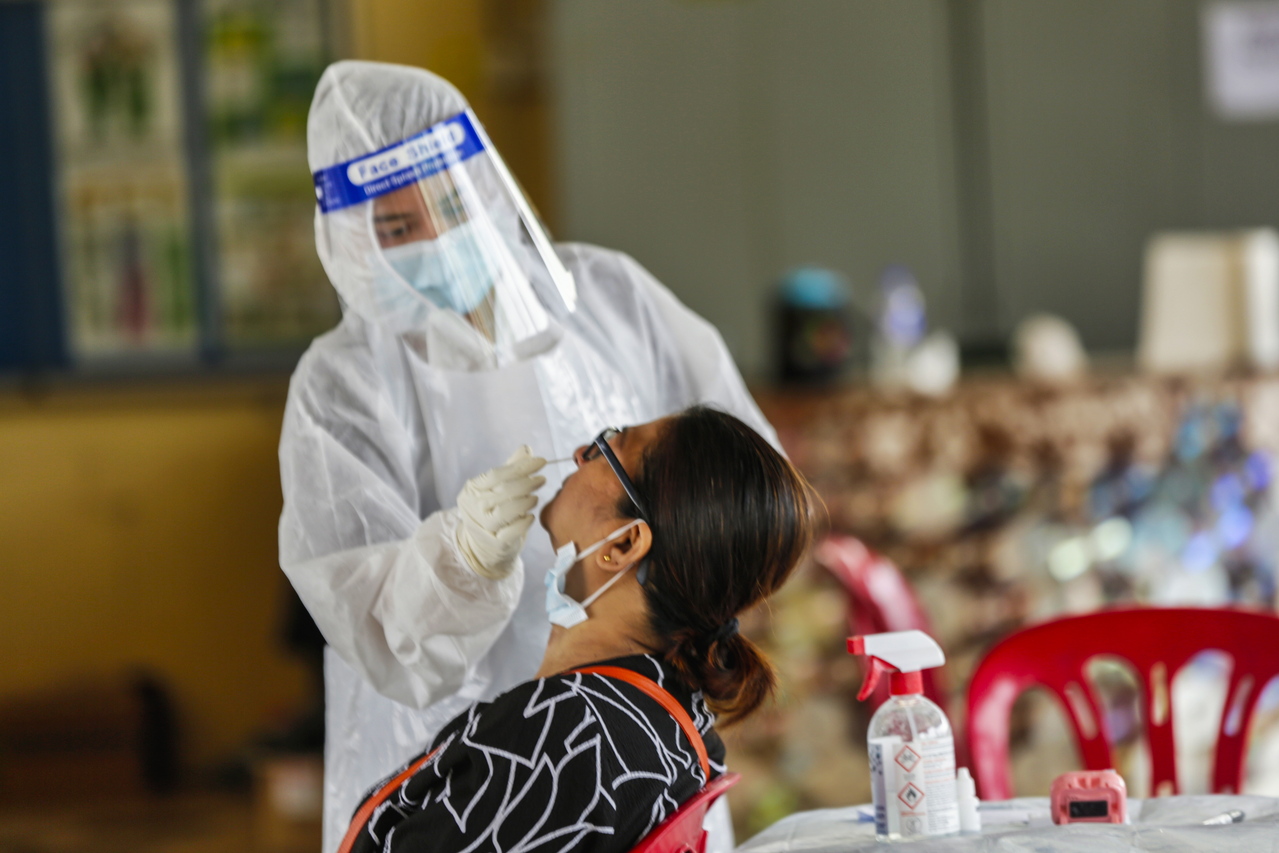Malaysia records new high as daily cases exceed 5,000
Sign up now: Get insights on the biggest stories in Malaysia

A woman undergoing a swab test for Covid-19 in Petaling Jaya, near Kuala Lumpur, on Jan 27, 2021.
PHOTO: EPA
KUALA LUMPUR - Malaysia registered another record high for new coronavirus cases on Friday (Jan 29), topping over 5,000 daily infections even though most of the country is into its third week of a strict partial lockdown.
Malaysia registered 5,725 cases, a massive jump from the previous high of 4,275 cases registered last Saturday (Jan 23).
Except for Sarawak state, the other 12 Malaysian states and the three federal territories including Kuala Lumpur have been under the movement control order (MCO) from Jan 13.
The country's cumulative Covid-19 infections passed the 200,000 mark on Friday to notch 203,933 cases since officials started tallying the data in January last year.
The total figure for Malaysia's 32 million population is in contrast to neighbouring Thailand's cumulative figure of 17,023 on Friday even though it has a much larger population of around 69 milion people.
Indonesia (population: 270 million) has the highest cumulative figure in South-east Asia, with 1,051,795 cases, and the Philippines (population: 108 million) second-highest, with 521,413, on Friday.
Malaysia logged another 16 deaths, bringing the total to 733 deaths.
The number of active coronavirus patients in the country stood at 45,478, straining the healthcare system.
The government has warned that daily cases could reach 8,000 a day by late March or late May, based on a predictive modelling analysis, unless the rate of infectivion is slowed down.
The sobering figures come less than two weeks before Chinese New Year celebrations in the country on Feb 12 and 13.
The MCO is scheduled to end on Feb 4, with top officials publicly indicating that they are not keen to extend the strict curbs further as they fear deepening the damage to jobs and the economy.
The government on Friday said it is in the midst of tweaking its health protocols, which it calls standard operating procedures (SOPs), for the Chinese New Year celebrations. Reports indicated that the SOPs would include limiting gatherings in a household to 20 people.
Bleeding badly due to the movement restrictions, tourism and trade groups on Friday urged the government to start discussions with Singapore with the view of allowing vaccinated Singapore residents to enter Malaysia without needing to quarantine.
The government has, meanwhile, continued to attract brickbats for flip-flopping on restricting movements so that infections could be reduced.
Senior Minister for Security Ismail Sabri Yaakob on Friday said night markets would now be allowed to operate from 4pm to 10pm.
These added to other types of businesses that have been allowed to remain open, including jewellery and skincare shops, to those selling luggage, electrical appliances and spectacles.
In the first MCO imposed from March 18 for some two months, only supermarkets and pharmacies were allowed to open.

<p>A woman walks on a deserted street outside a shopping mall, during a lockdown due to the coronavirus disease (COVID-19) outbreak, in Kuala Lumpur, Malaysia January 13, 2021. REUTERS/Lim Huey Teng</p>
PHOTO: X07021
Another rule was relaxed on Friday, allowing both state and federal lawmakers to travel across district and state lines despite a nationwide ban on such travels under MCO 2.0.
Finance Minister Tengku Zafrul Aziz has, meanwhile, given his assurance that Malaysia will not resort to a "total lockdown" even if the country faces a worst-case scenario in terms of coronavirus infections.
Senior Minister Azmin Ali previously also said that a total lockdown should be a "last resort" action, and had called for economic sectors to be kept open.
Meanwhile, the Health Ministry said it has completed a dry run of the Covid-19 vaccine delivery exercise to ensure that thorough preparations are made before the vaccine reaches Malaysia.
Malaysia is expected to start its vaccination programme at the end of next month.
Health Minister Adham Baba said the dry run involved a delivery to the Belaga Health Clinic in Sarawak on Friday.
"On Jan 8, the Drug Control Authority granted conditional registration approval of the Covid-19 vaccine produced by Pfizer - Comirnaty - and Malaysia is expected to receive the vaccine supply for the first phase of vaccination at the end of February.
"As is well known, the Comirnaty vaccine requires storage at ultra cold temperatures, minus 75 deg C (plus/minus 15 deg C), which poses a challenge in the vaccine distribution process," he said.
The main objective of the run, he added, was to evaluate the ultra-cold temperature retention capacity throughout the delivery chain, from the manufacturer to the selected facility.


